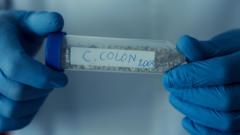Researchers are on the brink of resolving one of history's biggest mysteries: the accurate origins of Christopher Columbus. Known in Spanish as Cristóbal Colón, the famed explorer completed his historic journey to the Americas in 1492. Despite his notorious voyages, uncertainty about his provenance has lingered for centuries, with conflicting claims from regions across Europe.
In 2003, Granada University's forensic expert José Antonio Lorente, along with historian Marcial Castro, collected DNA samples from purported Columbus remains in Seville Cathedral. They also retrieved DNA from the explorer’s son Hernando and brother Diego. Their mission: to verify Columbus’s remains and identify his true birthplace by comparing this DNA with historical figures from various European regions.
The study's results are set to be disclosed in a "documentary thriller" by Spain's broadcaster RTVE, airing on a national holiday commemorating Columbus’s landfall in the Americas. Preliminary findings already confirm the Seville remains are indeed those of Columbus, though there is speculation about additional remains in the Dominican Republic.
Though historically deemed a Genoese native, new DNA evidence has whittled potential birthplaces to eight contenders across Spain, Portugal, and Italy. Noteworthy theories include possible origins in the Spanish regions of Galicia, Mallorca, Navarre, Castilla La Mancha, and even the Portuguese narrative of a nobleman-pirate alias Pedro de Ataíde. Insightful questions touch on lineage, with one theory suggesting Columbus hid his Jewish identity amidst Spain's Catholic rule.
This study’s revelations could fundamentally alter historical understanding. While still analyzing crucial recent data for further insights, Prof Lorente’s team promises comprehensive findings soon. Tune into TVE 1 for the anticipated documentary “Colón ADN. Su verdadero origen” airing Saturday night.
In 2003, Granada University's forensic expert José Antonio Lorente, along with historian Marcial Castro, collected DNA samples from purported Columbus remains in Seville Cathedral. They also retrieved DNA from the explorer’s son Hernando and brother Diego. Their mission: to verify Columbus’s remains and identify his true birthplace by comparing this DNA with historical figures from various European regions.
The study's results are set to be disclosed in a "documentary thriller" by Spain's broadcaster RTVE, airing on a national holiday commemorating Columbus’s landfall in the Americas. Preliminary findings already confirm the Seville remains are indeed those of Columbus, though there is speculation about additional remains in the Dominican Republic.
Though historically deemed a Genoese native, new DNA evidence has whittled potential birthplaces to eight contenders across Spain, Portugal, and Italy. Noteworthy theories include possible origins in the Spanish regions of Galicia, Mallorca, Navarre, Castilla La Mancha, and even the Portuguese narrative of a nobleman-pirate alias Pedro de Ataíde. Insightful questions touch on lineage, with one theory suggesting Columbus hid his Jewish identity amidst Spain's Catholic rule.
This study’s revelations could fundamentally alter historical understanding. While still analyzing crucial recent data for further insights, Prof Lorente’s team promises comprehensive findings soon. Tune into TVE 1 for the anticipated documentary “Colón ADN. Su verdadero origen” airing Saturday night.



















